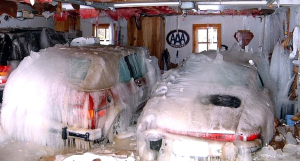Old Man Winter’s A-Comin’!
Hey folks, it’s finally getting to be my favorite weather outside–what my friends and I have called “HoodieWeather” for as long as I can remember. Well, quick on the heels of Autumn is going to be Winter which, depending on your geographical area, will entail cooler (or colder) temperatures at the very least, and at worst, an emergency trip to the Home Depot for shovels, snowblowers, and generators when a good blizzard comes through and locks up normal life for a few days or a week.
Well, are you prepared to deal with winter this year? Or with a crazy storm, if it comes through?
First, if you don’t have a generator, get one. When all else fails, a source of electricity is a life-saver. If you have the space, get two of them, and the next time your whole neighborhood is in the dark, you could probably find someone to rent your spare to. Do this enough times, and it shouldn’t take five years to pay itself off! If you already have a generator–write this down, it’s important–chances are good that it’s been sitting all year in your shed or garage, untouched. The problem with this is that the gasoline has probably begun to deteriorate into a sloppy, slimy gel at the bottom of the tank. This will clog your fuel injectors, and prevent your motor from ever getting started when you need it most. Take your generator out, bring it back to life, and run it a few times now, while you have the time to figure things out if it won’t start. Engines like to run, so knock the cobwebs out of yours now!
Second, get your furnace a tune-up. You can replace the filter yourself, but get someone out to your home to give your furnace a thorough inspection. The last thing you’ll want to have to deal with is losing your home’s heat on the coldest night of the entire year (which, as Murphy’s Law states, is exactly when it will happen).
Third, check on your water pipes. When your pipes aren’t insulated correctly, they can freeze–and when they freeze, they can burst. Who needs to deal with a near-freezing lake in their basement? And actually–to add to that point, it wouldn’t hurt you to know where your main system water shutoff valves are located. You’ll save yourself time and energy simply by knowing where these are, because there’s a fair amount of panic involved when a pipe bursts, and every second the valve is open can cost you 20 or 30 extra minutes of cleaning up after a gusher.
Do the same with your gas shutoff valve, too–any leak is cause for immediate evacuation, and not knowing where the valve is could cost you dearly when the temperature in your home drops, and your furnace decides to try to kick on. BOOM! Here’s an easy way to find both of them.
There is still plenty of time to get these things done–get after them now, and you’ll thank yourself later. A little preparation goes a looooong way!

